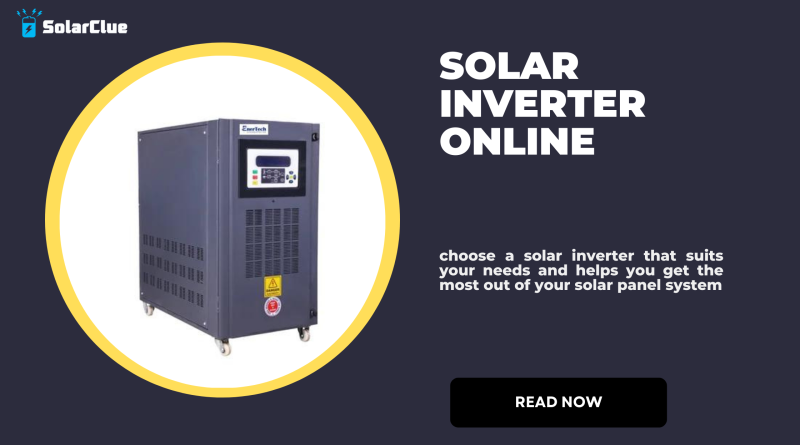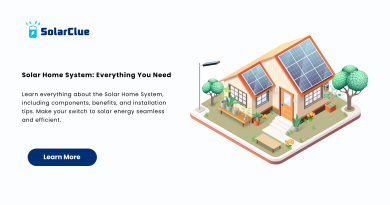Solar Inverter Online
Hey there! So, you’re interested in solar energy and thinking about buying a solar inverter online? That’s fantastic! Solar energy is becoming more popular because it’s clean, sustainable, and can save you money on electricity bills. But before you click that “buy” button, there’s a lot to consider. Don’t worry—I’m here to break it all down for you in simple terms. Let’s dive into what a solar inverter is, why it’s important, and how you can make a smart purchase online.
Table of Contents
What is a Solar Inverter?
Imagine you have a solar panel system on your roof. These panels capture sunlight and turn it into direct current (DC) electricity. However, most home appliances and the electricity grid use alternating current (AC) electricity. This is where the solar inverter comes in. It converts the DC electricity from your solar panels into AC electricity, making it usable for your home.
Why You Need a Solar Inverter
1.Conversion of Power: As mentioned, solar panels generate DC power, but most home appliances run on AC power. Without an inverter, you wouldn’t be able to use the electricity your solar panels produce.
2.Efficiency: A good inverter ensures that the electricity from your solar panels is converted efficiently. This means more of the solar energy is used in your home or sent to the grid, rather than wasted.
3.Monitoring and Control: Modern solar inverters come with features that allow you to monitor the performance of your solar system. This means you can track how much energy you’re generating and consuming.
Types of Solar Inverters
When shopping for a solar inverter online, you’ll encounter a few different types. Here’s a quick overview:
1.String Inverters: These are the most common and affordable. They work by connecting all your solar panels in a series, or “string,” and converting the DC electricity to AC in one go. If one panel underperforms or is shaded, it can affect the entire string.
2.Microinverters: These are attached to each solar panel individually. They’re more expensive but can be more efficient since each panel works independently. This setup can also make it easier to identify and fix issues.
3.Power Optimizers: These are similar to microinverters but are usually used with string inverters. They enhance the performance of each panel and improve overall efficiency.
4.Hybrid Inverters: These inverters can handle both solar power and battery storage. They’re great if you’re considering adding batteries to store excess energy for later use.
Factors to Consider When Buying a Solar Inverter Online
Purchasing a solar inverter online can be a bit overwhelming due to the many options available. Here are some factors to consider to ensure you make the right choice:
1. Wattage and Capacity
The inverter you choose should match the capacity of your solar panel system. If your solar panels produce 5,000 watts of power, you need an inverter that can handle that amount. Check the inverter’s wattage rating to make sure it’s compatible.
2. Efficiency
Efficiency measures how well the inverter converts DC to AC power. Higher efficiency means less power is lost during conversion. Look for an inverter with high efficiency ratings—typically above 95% is good.
3. Warranty and Support
A good warranty is crucial. Most quality inverters come with a warranty of at least 5-10 years. Ensure the manufacturer or seller provides good customer support in case you need help or face any issues.
4. Brand Reputation
Stick to reputable brands known for reliability and performance. Check online reviews and ratings to see what other users have experienced. Brands with a strong reputation are often a safer choice.
5. Features and Technology
Modern inverters come with various features like monitoring apps, remote control, and more. Decide which features are important to you and ensure the inverter you choose supports them.
6. Installation
While the inverter itself is important, consider the installation process. Some online sellers might offer installation services or recommend local professionals. Make sure you have a plan for getting your inverter installed properly.
7. Cost
Cost is always a consideration. Solar inverters come in a range of prices depending on their type and features. While it’s tempting to go for the cheapest option, remember that quality and efficiency are worth the investment. Sometimes spending a bit more upfront can save you money in the long run.
Here’s a handy table to compare different types of solar inverters:
| Type | Advantages | Disadvantages | Best For |
|---|---|---|---|
| String Inverter | Cost-effective, simple setup | Performance can be affected by shading | Budget-conscious buyers |
| Microinverter | Maximizes panel efficiency, reduces shading impact | More expensive, complex setup | Homes with shading issues, high performance needs |
| Power Optimizer | Enhances panel performance, works with string inverters | Higher cost, more components | Homes with shading or varied panel orientations |
| Hybrid Inverter | Supports battery storage, versatile | Most expensive, complex setup | Homes looking to add battery storage |
Where to Buy a Solar Inverter Online
There are several places you can buy a solar inverter online. Here are a few options:
1.Manufacturer Websites: Buying directly from the manufacturer’s website can sometimes offer better deals or additional warranties.
2.Specialized Solar Retailers: Websites that specialize in solar products often have a wide range of inverters and knowledgeable customer support.
3.General E-Commerce Sites: Websites like Amazon or eBay offer various options, but be sure to check reviews and seller ratings.
4.Local Solar Companies: Many local solar installation companies have online stores where you can buy inverters and other solar equipment.
Conclusion
So there you have it! Buying a solar inverter online doesn’t have to be a daunting task. By understanding what a solar inverter does, the different types available, and what factors to consider, you’re well on your way to making an informed decision. Remember to check the specifications, warranty, and reviews before making a purchase.
If you follow these guidelines, you’ll be better equipped to choose a solar inverter that suits your needs and helps you get the most out of your solar panel system. Happy shopping, and here’s to a greener, more sustainable future!
Visit SolarClue® to see the best Solar Inverter.. SolarClue® actively sells solar energy products at discounts of up to 50% on its online marketplace.
FAQ
1. How do I know which solar inverter is right for my solar panel system?
- Check the wattage rating of both your solar panels and the inverter. The inverter should be able to handle the total output of your solar panel system. Consult with a professional if you’re unsure.
2. What is the difference between a string inverter and a microinverter?
- A string inverter connects multiple panels together and converts DC to AC in one unit. A microinverter is attached to each panel individually, allowing each panel to operate independently.
3. Can I install a solar inverter myself?
- While some DIY enthusiasts might attempt to install an inverter themselves, it’s generally recommended to have a professional do the installation to ensure safety and compliance with local regulations.
4. What should I do if my solar inverter isn’t working properly?
- First, check the warranty and support options provided by the manufacturer or seller. You may need to contact their customer support or hire a professional to diagnose and fix the issue.
5. Are there any incentives or rebates for buying solar inverters?
- Depending on where you live, there might be incentives or rebates available for solar equipment. Check with local government programs or utility companies to see if you qualify.



